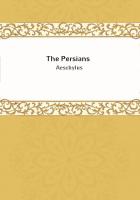On his return into the city Pompey married Cornelia, the daughter of Metellus Scipio, not a maiden, but lately left a widow by Publius, the son of Crassus, her first husband, who had been killed in Parthia. The young lady had other attractions besides those of youth and beauty;for she was highly educated, played well upon the lute, and understood geometry, and had been accustomed to listen with profit to lectures on philosophy; all this, too, without in any degree becoming unamiable or pretentious, as sometimes young women do when they pursue such studies. Nor could any fault be found either with her father's family or reputation. The disparity of their ages was, however, not liked by everybody; Cornelia being in this respect a fitter match for Pompey's son. And wiser judges thought it rather a slight upon the commonwealth when he, to whom alone they had committed their broken fortunes, and from whom alone, as from their physician, they expected a cure to these distractions, went about crowned with garlands and celebrating his nuptial feasts, never considering that his very consulship was a public calamity, which would never have been given him, contrary to the rules of law, had his country been in a flourishing state. Afterwards, however, he took cognizance of the cases of those that had obtained offices by gifts and bribery, and enacted laws and ordinances, setting forth the rules of judgment by which they should be arraigned; and regulating all things with gravity and justice, he restored security, order, and silence to their courts of judicature, himself giving his presence there with a band of soldiers. But when his father-in-law, Scipio, was accused, he sent for the three hundred and sixty judges to his house, and entreated them to be favourable to him; whereupon his accuser, seeing Scipio come into the court, accompanied by the judges themselves, withdrew the prosecution. Upon this Pompey was very ill spoken of, and much worse in the case of Plancus; for whereas he himself had made a law putting a stop to the practice of ****** speeches in praise of persons under trial, yet notwithstanding this prohibition, he came into court and spoke openly in commendation of Plancus, insomuch that Cato, who happened to be one of the judges at that time, stopping his ears with his hands, told him he could not in conscience listen to commendations contrary to law. Cato upon this was refused, and set aside from being a judge, before sentence was given, but Plancus was condemned by the rest of the judges, to Pompey's dishonour. Shortly after, Hypsaeus, a man of consular dignity, who was under accusation, waited for Pompey's return from his bath to his supper, and falling down at his feet, implored his favour; but he disdainfully passed him by, saying, that he did nothing else but spoil his supper. Such partiality was looked upon as a great fault in Pompey and highly condemned; however, he managed all things else discreetly, and having put the government in very good order, he chose his father-in-law to be his colleague in the consulship for the last five months. His provinces were continued to him for the term of four years longer, with a commission to take one thousand talents yearly out of the treasury for the payment of his army.
This gave occasion to some of Caesar's friends to think it reasonable, that some consideration should be had of him too, who had done such signal services in war and fought so many battles for the empire, alleging, that he deserved at least a second consulship, or to have the government of his province continued, that so he might command and enjoy in peace what he had obtained in war, and no successor come in to reap the fruits of his labour and carry off the glory of his actions. There arising some debate about this matter, Pompey took upon him, as it were out of kindness to Caesar, to plead his cause, and allay any jealousy that was conceived against him, telling them that he had letters from Caesar, expressing his desire for a successor, and his own discharge from the command; but it would be only right that they should give him leave to stand for the consulship though in his absence. But those of Cato's party withstood this, saying, that if he expected any favour from the citizens, he ought to leave his army and come in a private capacity to canvass for it. And Pompey's ****** no rejoinder, but letting it pass as a matter in which he was overruled, increased the suspicion of his real feelings towards Caesar. Presently, also, under pretence of a war with Parthia, he sent for his two legions which he had lent him.
However, Caesar, though he well knew why they were asked for, sent them home very liberally rewarded.















